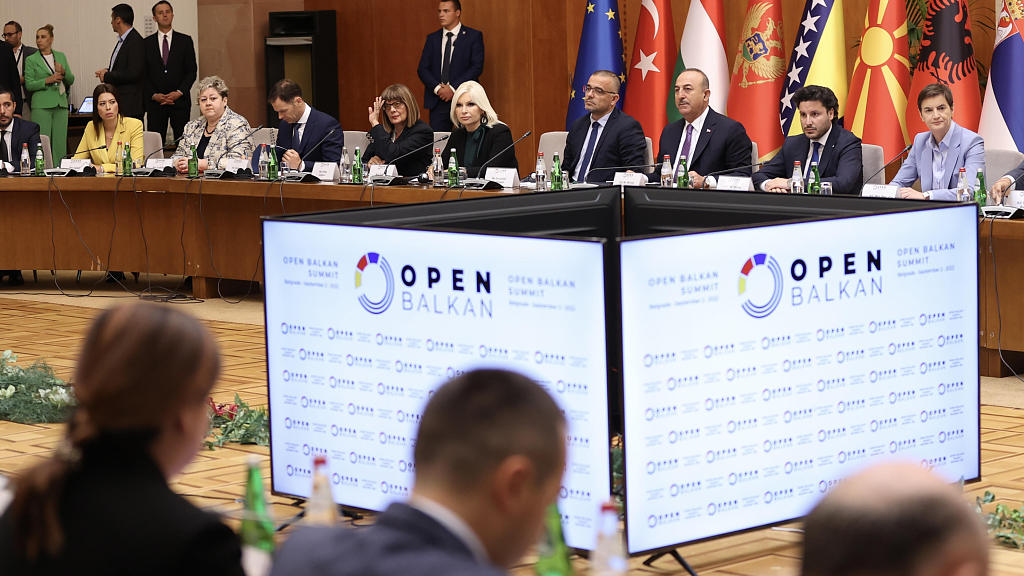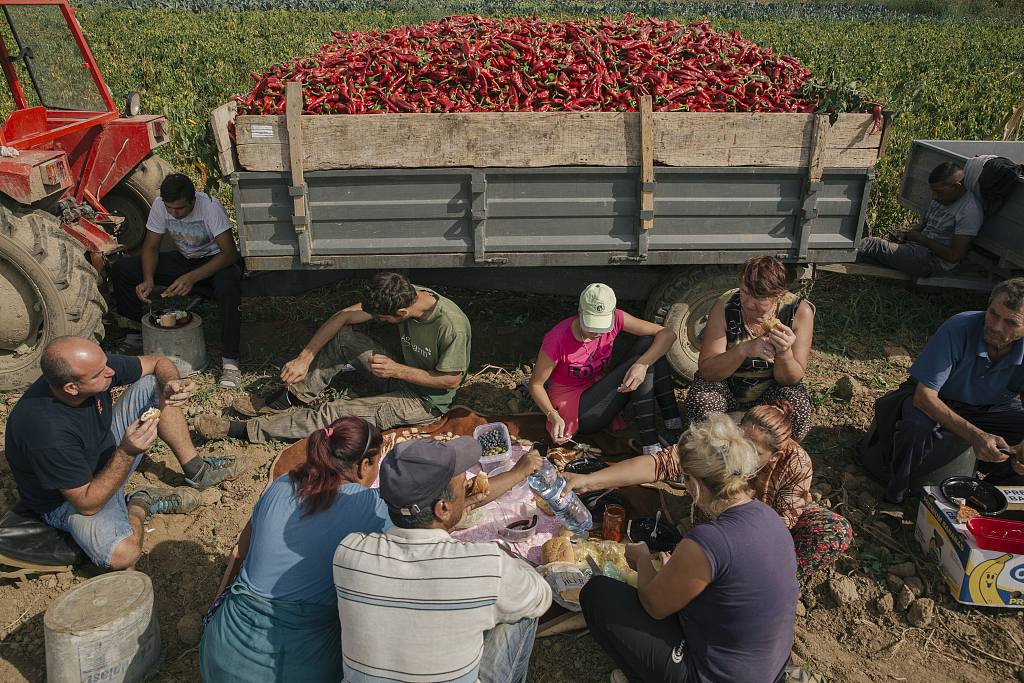
A view of the Open Balkan Initiative summit in Belgrade, Serbia, September 2, 2022. /CFP
A view of the Open Balkan Initiative summit in Belgrade, Serbia, September 2, 2022. /CFP
Editor's note: Nikola Mikovic is a freelance journalist based in Serbia. He covers mostly Russian, Ukrainian and Belarusian foreign policy issues and writes for multiple web magazines. The article reflects the author's opinions, and not necessarily those of CGTN.
While a new "iron curtain" is descending between Russia and the West, leaders of several Balkan countries are seeking to develop close economic cooperation in the region, where various global powers have their own geopolitical interests. The United States is strongly supporting the integration of all regional actors into the Open Balkan Initiative, while the European Union seems to have different priorities for the Balkan nations that are still not members of the bloc.
Nominally, both the U.S. and the EU back the Open Balkan Initiative – launched three years ago by the leaders of Serbia, Albania and North Macedonia. In reality, however, Brussels seems to encourage all the countries in the region to stick to the Berlin Process – a form of cooperation between the Western Balkans and the EU, while Washington sees the Open Balkan Initiative as an "effective tool for countries to use borders to bring them together, not divide them." What the U.S. and the EU have in common is that they both seek to preserve the region in their zone of influence.
The Balkan nations, quite aware of their uneasy position in the turbulent world, seem to focus on resolving burning issues such as securing food and energy supplies in the coming winter. During the Open Balkan Initiative summit, held in Belgrade on September 2, leaders of Serbia, Albania and North Macedonia signed an agreement that regulates cooperation between the three countries in the field of food security. The two most important parts of the document refer to the guarantees that Serbia, North Macedonia and Albania will have priority in the mutual exchange of basic foodstuffs, so that their population will have enough food in crisis situations.
"This is the most important meeting for us, these are our neighbors. For us, there is no one more important than the people who are here with us," said Serbian President Aleksandar Vucic at the joint press conference with Prime Ministers of Northern Macedonia and Albania, Dimitar Kovacevski and Edi Rama.
Given that Serbia is the largest food producer in the Western Balkans, Belgrade will now have to export its grains, oil and other agricultural products to the two neighboring countries, regardless of a potential global food crisis. Critics would say that Serbia would have to "feed" Albania and North Macedonia.

Workers eat breakfast provided by the farmers who own the pepper fields in Donja Lokosnica, Serbia, September 25, 2020. /CFP
Workers eat breakfast provided by the farmers who own the pepper fields in Donja Lokosnica, Serbia, September 25, 2020. /CFP
Belgrade, however, hopes soon to achieve some of its energy goals. Serbia seeks to connect to Albania's planned liquefied natural gas terminal in order to ensure gas supplies in case the West eventually pressures Belgrade to stop purchasing Russian gas.
On the other hand, Montenegro and Bosnia and Herzegovina, although they are not full-fledged members of the Open Balkan Initiative, hope that they will have the same treatment as Albania and North Macedonia when it comes to food security in the region. In other words, Podgorica and Sarajevo want to make sure that Serbia will exclude them from any potential bans on exports of basic agricultural products. That is one of the reasons why Montenegro's Prime Minister Dritan Abazovic expects the tiny Adriatic nation to join the Open Balkan Initiative soon.
At the same time, Albanian Prime Minister Edi Rama suggests that countries such as Turkey, Italy, Greece and Hungary should also become members of the Open Balkan Initiative. Indeed, Foreign Ministers of Turkey and Hungary have attended the Belgrade summit, which could be interpreted as a symbolic message to Brussels, given that Budapest is often criticized for its close relations with Moscow, while Ankara has been an EU candidate for decades, with very little chances to join the bloc anytime soon, if at all.
Although Turkey recognizes itself as a Balkan nation, it is hard to imagine it as a member of the Open Balkan Initiative. Turkey is undoubtedly one of the strongest economies in the region, which means that it would have a strong political and economic dominance over the other member states if it joined the initiative. Hungary, on the other hand, is generally not considered a Balkan country, but it is reportedly ready to join Serbia, Albania and North Macedonia in their cooperation in the field of energy.
Some Western circles, however, do not see the Open Balkan Initiative as a positive step in regional integrations. According to the Rockefeller Brothers Fund-backed study published by the Balkan Forum, the initiative could "increase further divisions" in the region. It is worth noting that the Balkan Forum is based in Pristina – the capital of the self-proclaimed Kosovo, a territory that unilaterally declared independence from Serbia in 2008. Pristina's de facto authorities strongly reject any idea of Kosovo – where ethnic Albanians make up the majority of the population – joining the Open Balkan Initiative. Albania's Prime Minister considers their decision a mistake.
Indeed, Kosovo's potential membership in the Open Balkan Initiative would mean that Belgrade would have to implicitly recognize its breakaway province as an independent state. But since the United States, as a major foreign actor operating in the region, insists that the Open Balkan Initiative should include "all six Western Balkan countries at the same level," according to the Albanian Daily News, it seems to be a matter of time before Washington puts a pressure on Serbia to explicitly recognize the illegal secession of its own territory.
Meanwhile, the U.S. will continue encouraging Serbia, Albania and North Macedonia to continue developing all projects that are part of the Open Balkan Initiative. Time will tell who will benefit the most from this form of regional cooperation.
(If you want to contribute and have specific expertise, please contact us at opinions@cgtn.com. Follow @thouse_opinions on Twitter to discover the latest commentaries on CGTN Opinion Section.)

